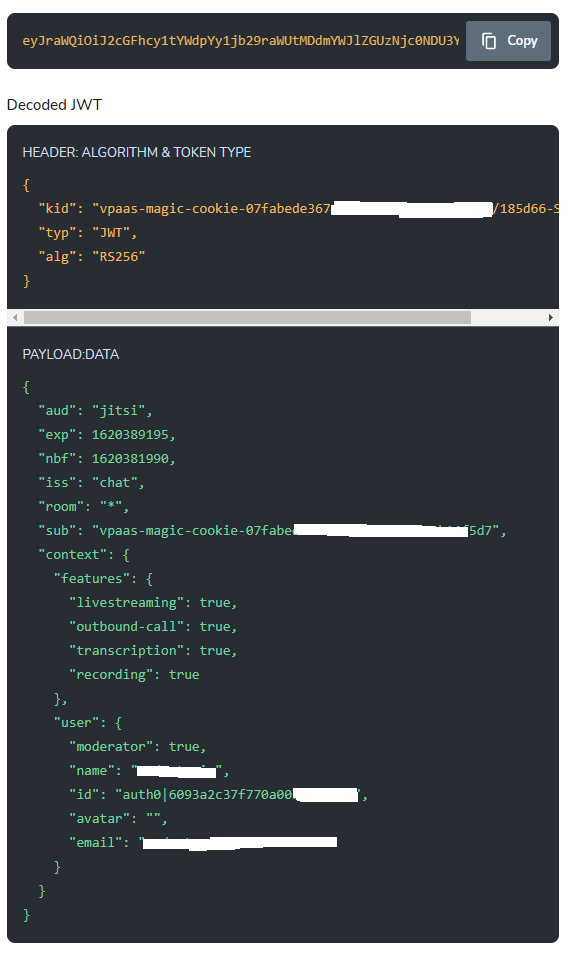Could anyone provide me an example for generating jwt tokens with three headers given as (alg, kid, typ) that has the format:
{
"alg": "RS256",
"kid": "vpaas-magic-cookie-1fc542a3e4414a44b2611668195e2bfe/4f4910",
"typ": "JWT"
}
under https://developer.8x8.com/jaas/docs/api-keys-jwt.
Jwt tokens get expired with a time limit of few hours so I am trying to find a way to generate the token in my code itself.
At the end, my javascript looks like this, where I add the jwt token inside the options list for authentication.
var options = {
roomName: "vpaas-magic-cookie-secretKey/Room123",
jwt: 'JWTTOKEN',
,
From what I have read under https://jwt.io/, I need the encoded key from the decoded details. As per the generating tokens, I think it uses HS256 algorithm. What are the steps to do this in javascript?
EDIT: After the user's answer, I did some changes to his code and I am currently generating half the JWT token. I am checking it with the already generated token on the server - Jaas.8x8
<script>
const HMACSHA256 = (stringToSign, secret) => "not_implemented"
// The header typically consists of two parts:
// the type of the token, which is JWT, and the signing algorithm being used,
// such as HMAC SHA256 or RSA.
const header = {
"kid": "vpaas-magic-cookie-07fabede3674457a84c95fsecretcode/myroom001",
"alg": "RS256",
"typ": "JWT"
}
const encodedHeaders = btoa(JSON.stringify(header))
// create the signature part you have to take the encoded header,
// the encoded payload, a secret, the algorithm specified in the header,
// and sign that.
const signature = HMACSHA256(`${encodedHeaders}`, "mysecret")
console.log(`${encodedHeaders}.${signature}`)
</script>
The token that gets generated from code is
eyJraWQiOiJ2cGFhcy1tYWdpYy1jb29raWUtMDdmYWJlZGUzNjc0NDU3YTg0Yzk1ZmE4MGIxNGY1ZDcvVGVzdFJhdW0wMDEiLCJhbGciOiJSUzI1NiIsInR5cCI6IkpXVCJ9.not_implemented
And the token that is already generated online is:
eyJraWQiOiJ2cGFhcy1tYWdpYy1jb29raWUtMDdmYWJlZGUzNjc0NDU3YTg0Yzk1ZmE4MGIxNGY1ZDcvMTg1ZDY2LVNBTVBMRV9BUFAiLCJ0eXAiOiJKV1QiLCJhbGciOiJSUzI1NiJ9.eyJhdWQiOiJqaXRzaSIsImV4cCI6MTYyMDM4ODU3NiwibmJmIjoxNjIwMzgxMzcxLCJpc3MiOiJjaGF0Iiwicm9vbSI6IioiLCJzdWIiOiJ2cGFhcy1tYWdpYy1jb29raWUtMDdmYWJlZGUzNjc0NDU3YTg0Yzk1ZmE4MGIxNGY1ZDciLCJjb250ZXh0Ijp7ImZlYXR1cmVzIjp7ImxpdmVzdHJlYW1pbmciOmZhbHNlLCJvdXRib3VuZC1jYWxsIjpmYWxzZSwidHJhbnNjcmlwdGlvbiI6ZmFsc2UsInJlY29yZGluZyI6ZmFsc2V9LCJ1c2VyIjp7Im1vZGVyYXRvciI6dHJ1ZSwibmFtZSI6IlRlc3QgVXNlciIsImlkIjoiYXV0aDB8NjA5M2EyYzM3Zjc3MGEwMDcxMGE5YzY5IiwiYXZhdGFyIjoiIiwiZW1haWwiOiJ0ZXN0LnVzZXJAY29tcGFueS5jb20ifX19.aNqg_VLXyafH8Se5rThe6TLz0F2AEnJSmuoZBQ4fXEm1PMx4SBRpelJsrmL76D_jKS5NT-GkuPDVcDgLv6nx9G4ywjws1AH4Lkt0FcJ3eH2OjbFI2WxPzJF_tDJbtPme5LJmGZwEa509v2QD0r-kr31M7FZ83S-kz3O1xKc33FnMJwNlqvgCSN2S0QwF6R5J01zDk41gCk0wGr3DXAmlz0FtCU0qJ5nN9iMUpr5QUY1D-hRApWMhoLPmxkuqnQKLjGwgxU8lh33wq_Laqu7qV57lYrI27er_c42YePwuitWEAAshQU4Ylf2v8sVRv06kQdFPVvICVdsTTI-DLbc3aQ
So basically the first few strings are right but the rest is not generated. I assume it has something to do with mysecret? What exactly is this?

